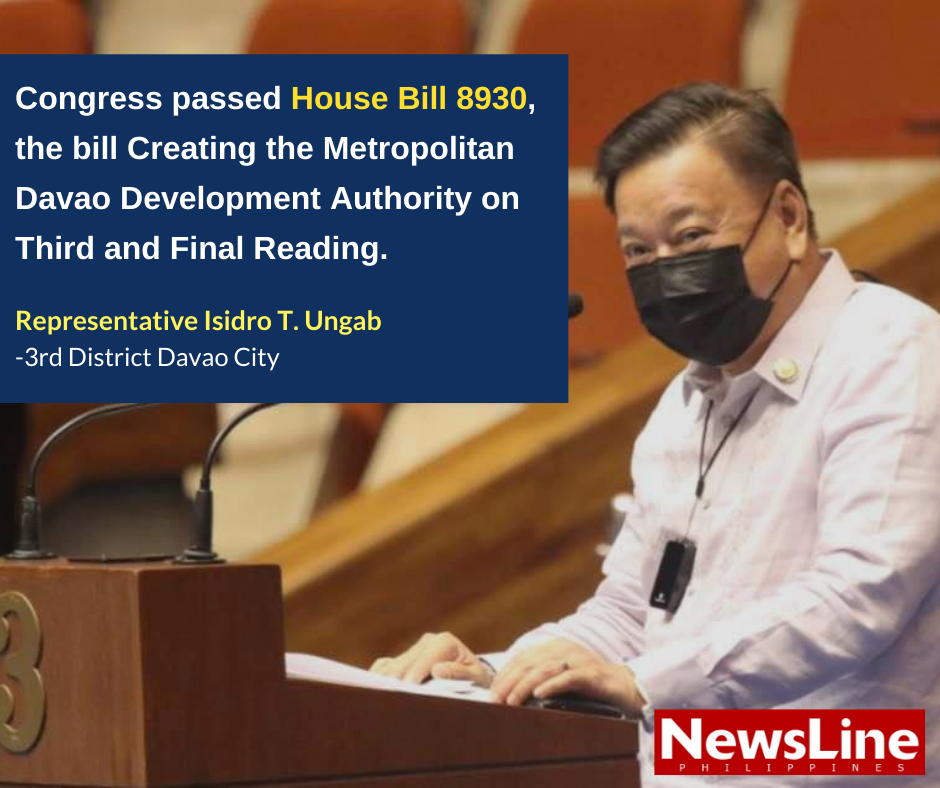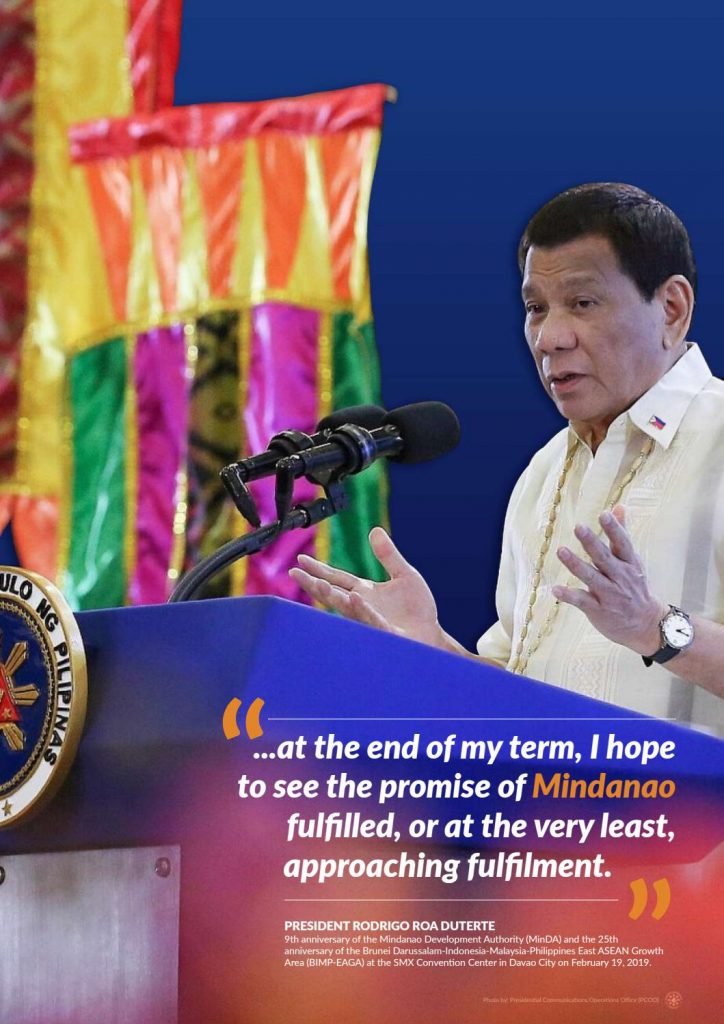DAVAO CITY — “I am comforted that the Metropolitan Davao Development Authority (MDDA) has finally been passed,” said Davao City Third District congressman Isidro Ungab on March 22, 2021, the day the bill was approved in Congress.
Ungab, the law’s proponent, stated that he pushed for MDDA because the time to pass Federalism is running out.
On July 29, 2020, the Bill was introduced. The bill is an initiative of the Metropolitan Davao Development Coordinating Committee (MDDCC), a special committee of the RDC-Davao led by Davao City Mayor Sara Duterte-Carpio.
According to Ungab, House Bill 8930, also known as “An Act Creating the Metropolitan Davao Development Authority (MDDA), Defining its Powers and Functions, and Providing Funds Therefor,” will promote the socioeconomic development of the Davao Region. “It’s like returning to the concept of the former One Davao.”
According to Ungab, the project’s brain, “it will function like that of the Metro Manila Development Authority (MMDA), this is what the leaders of Davao region long dreamed for this, because they know this is more of a complementation and this speaks of a sustainable and unified growth in different local government units, imagine we have one plan and one direction”.
The law which was approved in the House states, “Considering the rapid urbanization of Davao City and the increasing population of the cities pf Panabo, Tagum, and the Island Garden City of Samal (IGaCos) in Davao del Norte, the City of Digos in Davao del Sur, and the City of Mati in Davao Oriental, and the spatial, functional, and economic independence of these cities with municipalities of Sta. Cruz in Davao del Sur, Carmen in Davao del Norte, Maco in Davao de Oro, and Malita in Davao Occidental, it is likewise declared for the state to consider these local government units (LGUs) as a special development and administrative region, known as Metropolitan Davao”.
The MDDA services are provided across the boundaries of multiple and other interdependent political entities. The activities of which have a significant impact on one another and necessitate large expenditures.
Among the MDDA’s functions are development planning, which include developing medium- and long-term development plans, project development, evaluation, and packaging, investment programming, and coordinating and monitoring plans, programs, and project implementations.

Ungab stressed, “it is a holistic approach in the development of Davao region.” According to the approved Bill, the MDDA shall perform planning, implementation, monitoring, and coordination functions, as well as exercise regulatory and supervisory authority over the delivery of area-wide services within Metropolitan Davao.
The proposed metropolitan body’s other functions include establishing policies for Metro Davao’s traffic, waste management, and public safety and security, as well as coordinating, regulating, and enforcing the implementation of these programs and projects with the concerned national government.
MDDA: What does it mean to us?
What does this imply for the Davao Region and Mindanao? “It is an attempt to synchronize, coordinate, and accelerate the growth and development of the Davao region, particularly the capital cities and capital municipalities of the Davao Region.”
“There is unity on our approach in terms of development to unite the social-economic and developmental aspects of Davao region, which is composed of six cities and municipalities,” he added.
As of now, the movement of business in the Davao region, such as telecommunications, ports, roads, and road systems, is now connected, and it only needs to be synchronized, “we are to coordinate with each other even the waste utilization,” Ungab elaborates.
The business portfolio will also be linked, resulting in faster economic movement.
The Regional Development Council previously stated that the creation of MDDA is part of the Updated Philippine Development Plan (PDP), 2017-2022 and Davao Regional Development Plan (DRDP), 2017-2022 Midterm Update as one of three Metropolitan Areas to be pursued during the current planning period, alongside Metro Manila and Metro Cebu.
“Institutionalizing the policy of national dispersion through regional agglomeration to revitalize large cities and eventually stir them to expand their physical area for planning, as advocated in the National Spatial Strategy (NSS),” RDC said.
How will the MDDA get funds?
According to Ungab, the LGUs will contribute funds to the Metropolitan Davao Development Coordinating Committee’s operations (MDDCC)
Ungab stated that the MDDCCC will be tasked with ensuring “a single direction towards developing the coastal cities and towns along the Davao Gulf.”
The local government will collaborate closely with the Metropolitan Davao Development Coordinating Committee (MDDCC) to ensure that the city’s medium and long-term plans and programs, as well as its land use, are implemented in accordance with regional and national development objectives and priorities.
“Its functions will also include the preparation of priority programs and projects, the identification of funding sources, and the packaging of projects for funding institutions, as well as the proper monitoring of projects and programs and the recommendation of solutions should there be problems with implementation,” according to the press statement.
Each LGU in Metro Davao must form a steering committee to coordinate with the MDDCC.
Ungab revealed that the Metropolitan Davao Development Coordinating Committee (MDDCC) had previously approved the Terms of Reference for the development of a comprehensive and sustainable Metropolitan Davao urban master plan.
The Committee determined that a comprehensive and sustainable urban master plan for Metropolitan Davao was required to guide the metropolis’ future growth and development.
The urban master plan will aid in the realization of Metropolitan Davao’s vision of becoming “a highly industrialized and globally competitive metropolis with highly skilled and productive human resources, both men and women, and diverse but cohesive communities living in a safe, climate-resilient environment with modern and efficient infrastructure, sustained by governance that promotes equal opportunity for all.”

The Metropolitan Davao Sustainable Urban Master Plan shall cover the following areas of cooperation identified by the Metropolitan Davao LGUs: 1) Land use planning; 2) Agri- ecotourism promotion and management, and urban greening; 3) Davao Gulf coastal resource management; 4) Joint service delivery for urban facilities and services, including transport and traffic management, roads and other infrastructure development projects; 5) Joint service delivery for urban facilities and services – housing; solid waste management; sewerage systems; disaster risk reduction, public safety, integrated flood control and climate-change proofing; digital connectivity; and water and energy.
Also presented during the said meeting of the MDDCC was the Metropolitan Davao Urban Master Plan (MDUP), 2018-2040 which was commissioned by the Mindanao Development Authority (MinDA) in 2017. It was agreed that the MDUP shall be considered as input to the Metropolitan Davao Sustainable Urban Master Plan (MDSUMP) commissioned by the Committee.
In addition to supporting the MDDCC’s efforts to strengthen cooperation and resource sharing among Metro Davao LGUs, Mayor Duterte has committed to including Metro Davao LGUs in the scope of the DoTr’s ongoing Transportation and Traffic Master Plan formulation for the City of Davao. The effort will also be fed into the MDSUMP.
In light of these developments, Ungab believes that it is critical to strengthen ties between Davao region political and development leaders.
According to Ungab, with the establishment of the MDDA, Davao, as the center of Mindanao, will lead its socio-cultural and economic development agenda, boosting Mindanao’s economy. “Because we are connected in terms of plans and programs, it is expected to spread out, which will benefit the people.”
To claim victory over its creation, the MDDA development agenda must be people-centered and economically driven.
However, while the road for MDDA is being prepared, Ungab stated that jobs will be created because he hopes the first MDDA chair will have a heart and be a true development leader.

